Burt A. The Evolution of the British Empire and Commonwealth From the American Revolution
Подождите немного. Документ загружается.

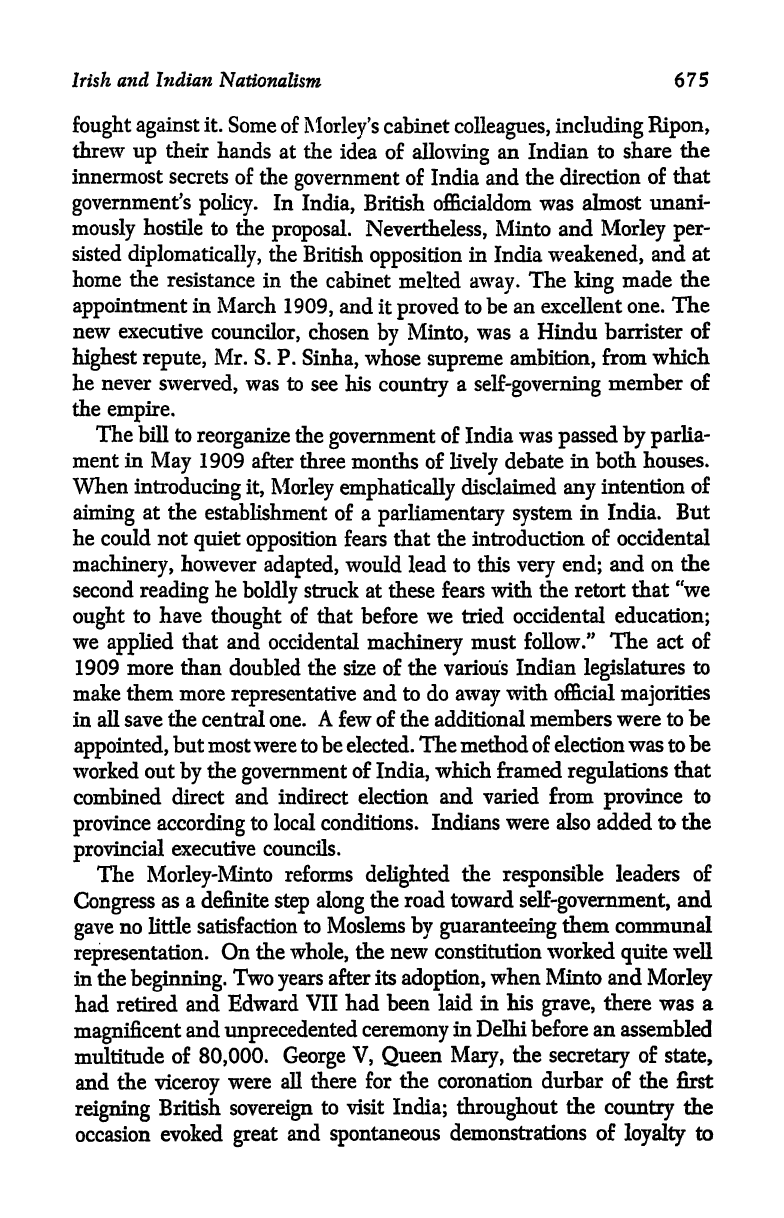
Irish
and Indian
Nationalism
675
fought
against
it.
Some
of
Morley's
cabinet
colleagues,
including
Ripon,
threw
up
their
hands
at
the
idea
of
allowing
an
Indian
to share
the
innermost secrets
of
the
government
of India
and
the
direction
of
that
government's
policy.
In
India,
British
officialdom was
almost
unani-
mously
hostile to
tie
proposal.
Nevertheless,
Minto
and
Morley
per-
sisted
diplomatically,
die
British
opposition
in India
weakened,
and
at
home
the
resistance
in
the
cabinet
melted
away.
The
king
made
die
appointment
in
March
1909,
and
it
proved
to
be
an excellent
one.
The
new
executive
councilor,
chosen
by
Minto,
was
a
Hindu
barrister
of
highest
repute,
Mr.
S. P.
Sinha,
whose
supreme
ambition,
from
which
he
never
swerved,
was
to
see
his
country
a
self-governing
member of
the
empire.
The
bill to
reorganize
the
government
of
India
was
passed
by parlia-
ment
in
May
1909
after three
months
of
lively
debate
in
both
houses.
When
introducing
it,
Morley emphatically
disclaimed
any
intention
of
aiming
at the
establishment
of a
parliamentary
system
in
India.
But
he
could not
quiet
opposition
fears
that the introduction
of occidental
machinery,
however
adapted,
would lead to
this
very
end;
and
on
the
second
reading
he
boldly
struck at these fears
with
die retort
that
"we
ought
to have
thought
of diat
before
we
tried occidental
education;
we
applied
that
and occidental
machinery
must follow."
The
act
of
1909 more than
doubled
die
size of
the
various
Indian
legislatures
to
make
them
more
representative
and
to do
away
widi
official
majorities
in
all save the central one.
A
few of
the
additional
members were
to be
appointed,
but
most
were
to be elected.
The method of election
was
to
be
worked
out
by
the
government
of
India,
which framed
regulations
that
combined
direct and
indirect
election and varied
from
province
to
province
according
to local conditions.
Indians
were
also added
to
the
provincial
executive councils.
The
Morley-Minto
reforms
delighted
die
responsible
leaders
of
Congress
as
a
definite
step along
the
road toward
self-government,
and
gave
no
litde
satisfaction
to
Moslems
by
guaranteeing
them
communal
representation.
On
the
whole,
the new constitution
worked
quite
well
in
the
beginning.
Two
years
after its
adoption,
when Minto
and
Morley
had
retired
and
Edward
VII had been
laid
in his
grave,
there
was
a
magnificent
and
unprecedented
ceremony
in Delhi before an
assembled
multitude
of
80,000.
George
V,
Queen
Mary,
the
secretary
of
state,
and
the
viceroy
were
all
there
for
the
coronation durbar
of the first
reigning
British
sovereign
to
visit
India;
throughout
the
country
the
occasion
evoked
great
and
spontaneous
demonstrations of
loyalty
to
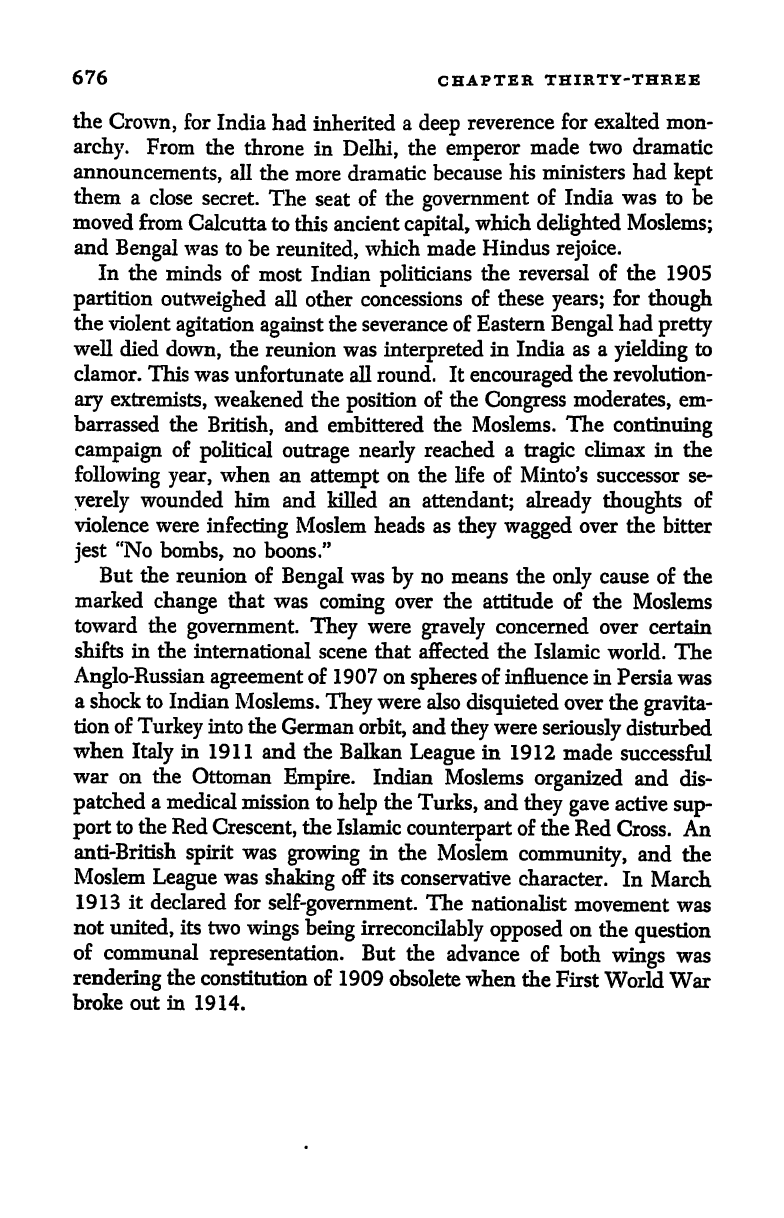
676
CHAPTER
THIRTY-THREE
the
Crown,
for
India
had inherited
a
deep
reverence
for
exalted mon-
archy.
From
the
throne in
Delhi,
the
emperor
made
two
dramatic
announcements,
all
the
more dramatic
because
his ministers had
kept
them
a
close
secret.
The
seat
of
the
government
of
India was to be
moved from
Calcutta
to
this
ancient
capital,
which
delighted
Moslems;
and
Bengal
was to
be
reunited,
which made
Hindus
rejoice.
In
the
minds of
most Indian
politicians
the
reversal of the 1905
partition
outweighed
all other
concessions of
these
years;
for
though
the
violent
agitation
against
the severance of
Eastern
Bengal
had
pretty
well
died
down,
the
reunion
was
interpreted
in India
as a
yielding
to
clamor.
This
was
unfortunate all
round. It
encouraged
the
revolution-
ary
extremists,
weakened
the
position
of
the
Congress
moderates,
em-
barrassed
the
British,
and embittered
the
Moslems.
The
continuing
campaign
of
political
outrage
nearly
reached
a
tragic
climax
in
the
following
year,
when an
attempt
on the
life
of
Minto's
successor se-
verely
wounded him
and
killed
an
attendant;
already
thoughts
of
violence were
infecting
Moslem
heads
as
they
wagged
over the
bitter
jest
"No
bombs,
no
boons."
But
the
reunion of
Bengal
was
by
no means the
only
cause
of
the
marked
change
that
was
coming
over
the
attitude of
the
Moslems
toward the
government. They
were
gravely
concerned over
certain
shifts in
the
international
scene
that
affected the Islamic
world. The
Anglo-Russian
agreement
of 1907 on
spheres
of
influence
in Persia
was
a
shock to
Indian
Moslems.
They
were
also
disquieted
over
the
gravita-
tion
of
Turkey
into
the
German
orbit,
and
they
were
seriously
disturbed
when
Italy
in
1911
and the Balkan
League
in 1912
made
successful
war
on the
Ottoman
Empire.
Indian
Moslems
organized
and dis-
patched
a
medical
mission
to
help
the
Turks,
and
they
gave
active
sup-
port
to
the
Red
Crescent,
the
Islamic
counterpart
of the
Red
Cross.
An
anti-British
spirit
was
growing
in
the Moslem
community,
and the
Moslem
League
was
shaking
off its
conservative
character.
In
March
1913
it
declared
for
self-government.
The
nationalist
movement
was
not
united,
its two
wings
being irreconcilably
opposed
on
the
question
of communal
representation.
But
the
advance
of
both
wings
was
rendering
the
constitution of 1909
obsolete
when
the
First
World
War
broke
out
in
1914.
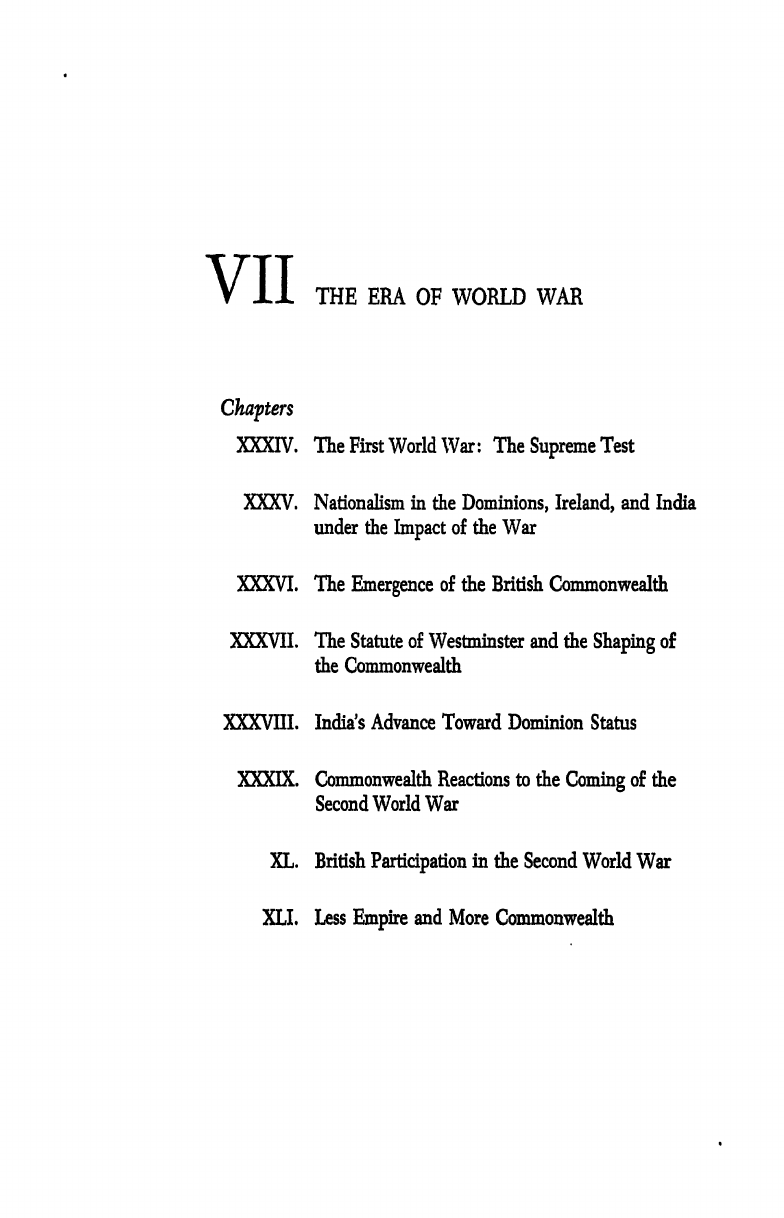
VII
THE
ERA
OF WORLD
WAR
Chapters
XXXIV. The First
World
War:
The
Supreme
Test
XXXV. Nationalism
in
the
Dominions,
Ireland,
and India
under
the
Impact
of the War
XXXVL
The
Emergence
of
the British Commonwealth
XXXVII.
The
Statute
of
Westminster
and the
Shaping
of
the
Commonwealth
XXXVIII.
India's Advance Toward
Dominion
Status
XXXIX. Commonwealth
Reactions to the
Coming
of the
Second World
War
XL. British
Participation
in
the Second
World
War
XLI.
Less
Empire
and
More
Commonwealth

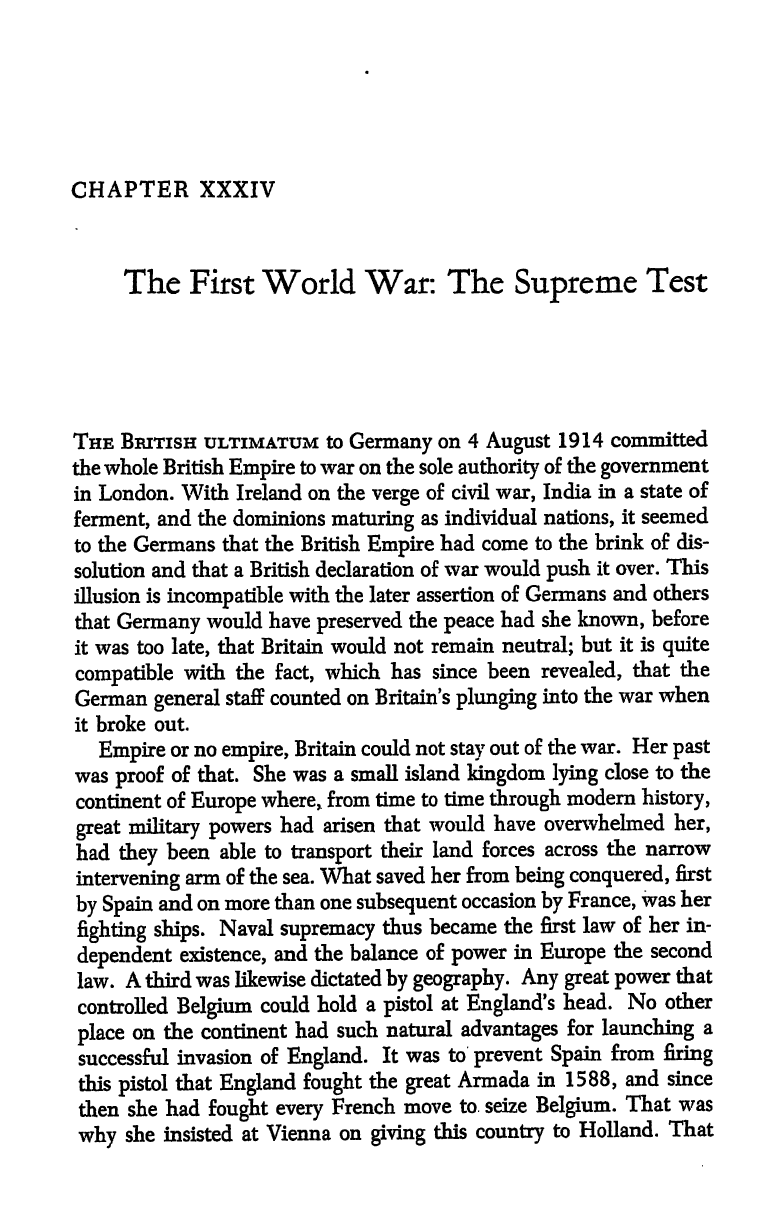
CHAPTER
XXXIV
The
First World
War:
The
Supreme
Test
THE
BRITISH
ULTIMATUM to
Germany
on
4
August
1914
committed
the
whole
British
Empire
to war
on
the sole
authority
of
the
government
in
London.
With Ireland
on the
verge
of civil
war,
India
in a
state
of
ferment,
and the
dominions
maturing
as individual
nations,
it
seemed
to
the
Germans
that
the British
Empire
had
come
to the
brink
of
dis-
solution
and
that a British
declaration
of
war
would
push
it
over.
This
illusion
is
incompatible
with the later
assertion
of Germans
and others
that
Germany
would
have
preserved
the
peace
had
she
known,
before
it
was too
late,
that Britain would
not
remain
neutral;
but
it
is
quite
compatible
with
the
fact,
which
has
since
been
revealed,
that
the
German
general
staff counted
on
Britain's
plunging
into
the
war
when
it
broke
out.
Empire
or
no
empire,
Britain could
not
stay
out
of the
war.
Her
past
was
proof
of that.
She
was
a
small
island
kingdom
lying
close to
the
continent
of
Europe
where,
from
time
to
time
through
modern
history,
great
military powers
had arisen
that
would
have overwhelmed
her,
had
they
been able
to
transport
their land
forces
across
the narrow
intervening
arm of
the
sea. What
saved
her
from
being
conquered,
first
by
Spain
and
on
more
than one
subsequent
occasion
by
France,
was
her
fighting
ships.
Naval
supremacy
thus
became
the
first
law of
her
in-
dependent
existence,
and
the
balance
of
power
in
Europe
the
second
law.
Athird
was likewise
dictated
by geography.
Any
great
power
that
controlled
Belgium
could
hold
a
pistol
at
England's
head.
No
other
place
on
the
continent
had
such
natural
advantages
for
launching
a
successful
invasion
of
England.
It
was
to
prevent
Spain
from
firing
this
pistol
that
England
fought
the
great
Armada
in
1588,
and
since
then
she
had
fought
every
French
move
to seize
Belgium.
That
was
why
she
insisted
at
Vienna
on
giving
this
country
to
Holland.
That
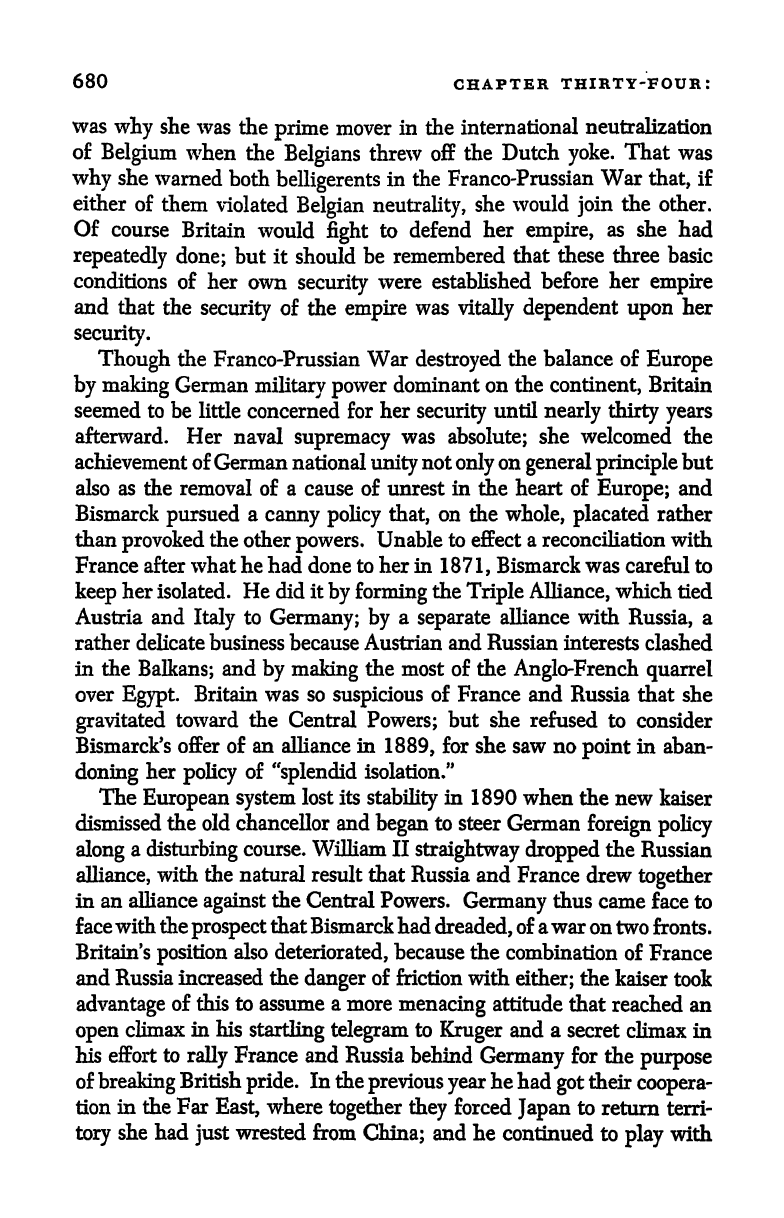
680
CHAPTER
THIRTY-FOUR:
was
why
she
was
the
prime
mover
in
the
international
neutralization
of
Belgium
when
the
Belgians
threw
off
the
Dutch
yoke.
That
was
why
she
warned
both
belligerents
in
the
Franco-Prussian
War
that,
if
either
of
them
violated
Belgian
neutrality,
she
would
join
the other.
Of
course
Britain
would
fight
to
defend
her
empire,
as she
had
repeatedly
done;
but it should
be remembered
that
these
three basic
conditions
of her
own
security
were established
before
her
empire
and
that the
security
of the
empire
was
vitally
dependent
upon
her
security.
Though
the
Franco-Prussian War
destroyed
the balance
of
Europe
by
making
German
military
power
dominant
on
the
continent,
Britain
seemed to be
little concerned for
her
security
until
nearly thirty years
afterward.
Her
naval
supremacy
was
absolute;
she welcomed the
achievement of
German
national
unity
not
only
on
general
principle
but
also as the
removal of
a
cause of unrest
in
the
heart of
Europe;
and
Bismarck
pursued
a
canny policy
that,
on
the
whole,
placated
rather
than
provoked
the other
powers.
Unable
to effect
a
reconciliation with
France
after
what he had done
to
her
in
1871,
Bismarck was careful
to
keep
her
isolated.
He did it
by
forming
the
Triple
Alliance,
which
tied
Austria
and
Italy
to
Germany;
by
a
separate
alliance
with
Russia,
a
rather delicate business because
Austrian and Russian
interests
clashed
in
the
Balkans;
and
by
making
the
most of the
Anglo-French
quarrel
over
Egypt.
Britain
was
so
suspicious
of France and
Russia that
she
gravitated
toward
the
Central
Powers;
but she
refused
to
consider
Bismarck's
offer
of
an
alliance
in
1889,
for she
saw
no
point
in
aban-
doning
her
policy
of
"splendid
isolation."
The
European
system
lost its
stability
in
1890
when
the new
kaiser
dismissed
the
old
chancellor and
began
to steer
German
foreign
policy
along
a
disturbing
course.
William II
straightway dropped
the
Russian
alliance,
with the natural
result that
Russia
and France
drew
together
in
an alliance
against
the
Central Powers.
Germany
thus
came
face to
face
with the
prospect
that
Bismarck
had
dreaded,
of a war
on
two fronts.
Britain's
position
also
deteriorated,
because the
combination
of France
and
Russia
increased
the
danger
of
friction with
either;
the
kaiser
took
advantage
of this to assume
a
more
menacing
attitude
that
reached an
open
climax
in
his
startling telegram
to
Kruger
and
a
secret
climax in
his
effort
to
rally
France and Russia
behind
Germany
for
the
purpose
of
breaking
British
pride.
In
the
previous
year
he
had
got
their
coopera-
tion
in the Far
East,
where
together
they
forced
Japan
to
return
terri-
tory
she had
just
wrested
from
China;
and he
continued
to
play
with
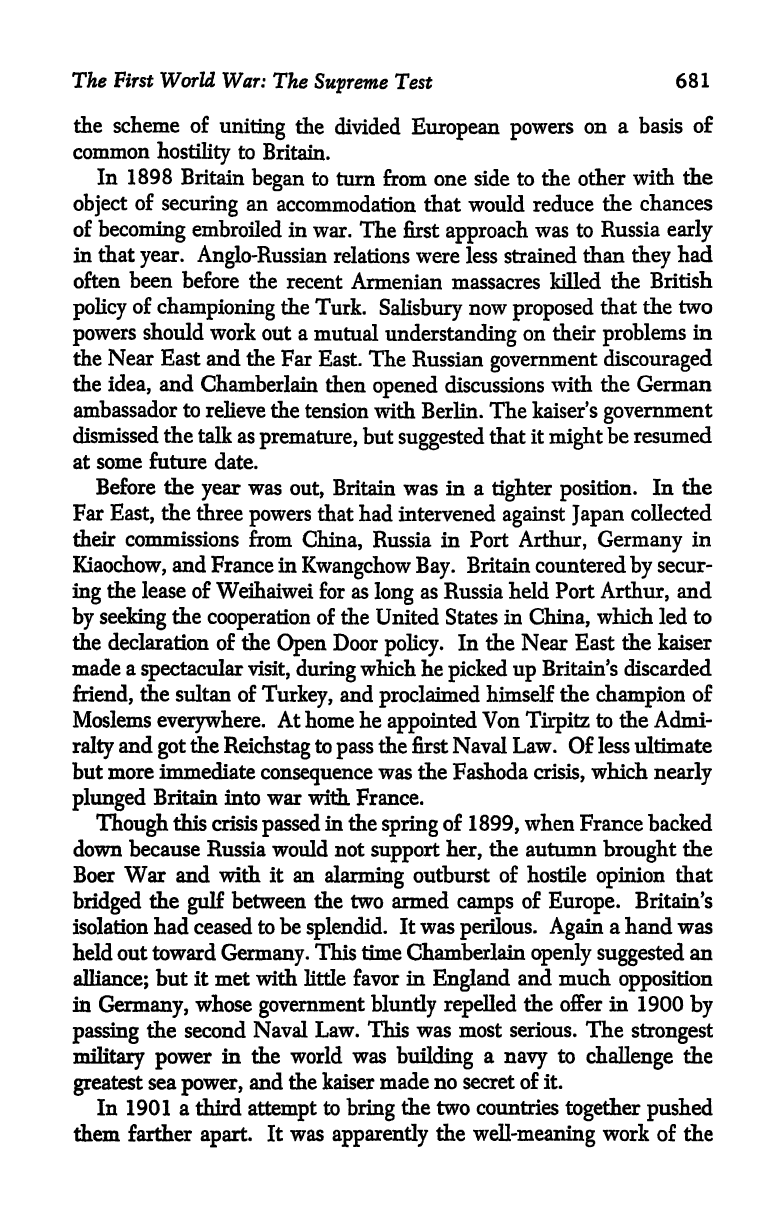
The
First World
War:
The
Supreme
Test
681
the scheme of
uniting
the
divided
European powers
on
a basis
of
common
hostility
to
Britain.
In
1898
Britain
began
to turn from one
side
to
the other
with
the
object
of
securing
an
accommodation
that would reduce
the
chances
of
becoming
embroiled
in
war.
The
first
approach
was to
Russia
early
in
that
year.
Anglo-Russian
relations
were
less strained
than
they
had
often
been
before
the
recent
Armenian massacres
killed
the
British
policy
of
championing
the
Turk.
Salisbury
now
proposed
that the
two
powers
should
work out a
mutual
understanding
on
their
problems
in
the
Near
East and the
Far
East. The Russian
government
discouraged
the
idea,
and
Chamberlain
then
opened
discussions
with
the German
ambassador
to
relieve
the
tension
with Berlin. The
kaiser's
government
dismissed
the
talk
as
premature,
but
suggested
that
it
might
be
resumed
at some future
date.
Before the
year
was
out,
Britain was in a
tighter
position.
In
the
Far
East,
the
three
powers
that
had intervened
against
Japan
collected
their commissions from
China,
Russia
in Port
Arthur,
Germany
in
Kiaochow,
and France
in
Kwangchow
Bay.
Britain countered
by
secur-
ing
the
lease of
Weihaiwei
for as
long
as Russia held
Port
Arthur,
and
by
seeking
the
cooperation
of the United
States
in
China,
which
led
to
the declaration
of the
Open
Door
policy.
In the
Near East
the kaiser
made
a
spectacular
visit,
during
which
he
picked
up
Britain's
discarded
friend,
the
sultan of
Turkey,
and
proclaimed
himself
the
champion
of
Moslems
everywhere.
At home
he
appointed
Von
Tirpitz
to the Admi-
ralty
and
got
the
Reichstag
to
pass
the first Naval
Law.
Of
less ultimate
but
more immediate
consequence
was the Fashoda
crisis,
which
nearly
plunged
Britain
into war
with France.
Though
this
crisis
passed
in the
spring
of
1899,
when
France
backed
down because Russia
would not
support
her,
the
autumn
brought
the
Boer War and with it an
alarming
outburst
of hostile
opinion
that
bridged
the
gulf
between
the two armed
camps
of
Europe.
Britain's
isolation
had
ceased
to be
splendid.
It was
perilous. Again
a
hand
was
held
out toward
Germany.
This
time
Chamberlain
openly
suggested
an
alliance;
but it met
with
little
favor in
England
and much
opposition
in
Germany,
whose
government
bluntly
repelled
the
offer in
1900
by
passing
the second
Naval Law.
This was most serious. The
strongest
military
power
in the world
was
building
a
navy
to
challenge
the
greatest
sea
power,
and the
kaiser made
no secret of it.
In
1901
a
third
attempt
to
bring
the
two countries
together pushed
them
farther
apart.
It
was
apparently
the
well-meaning
work
of the
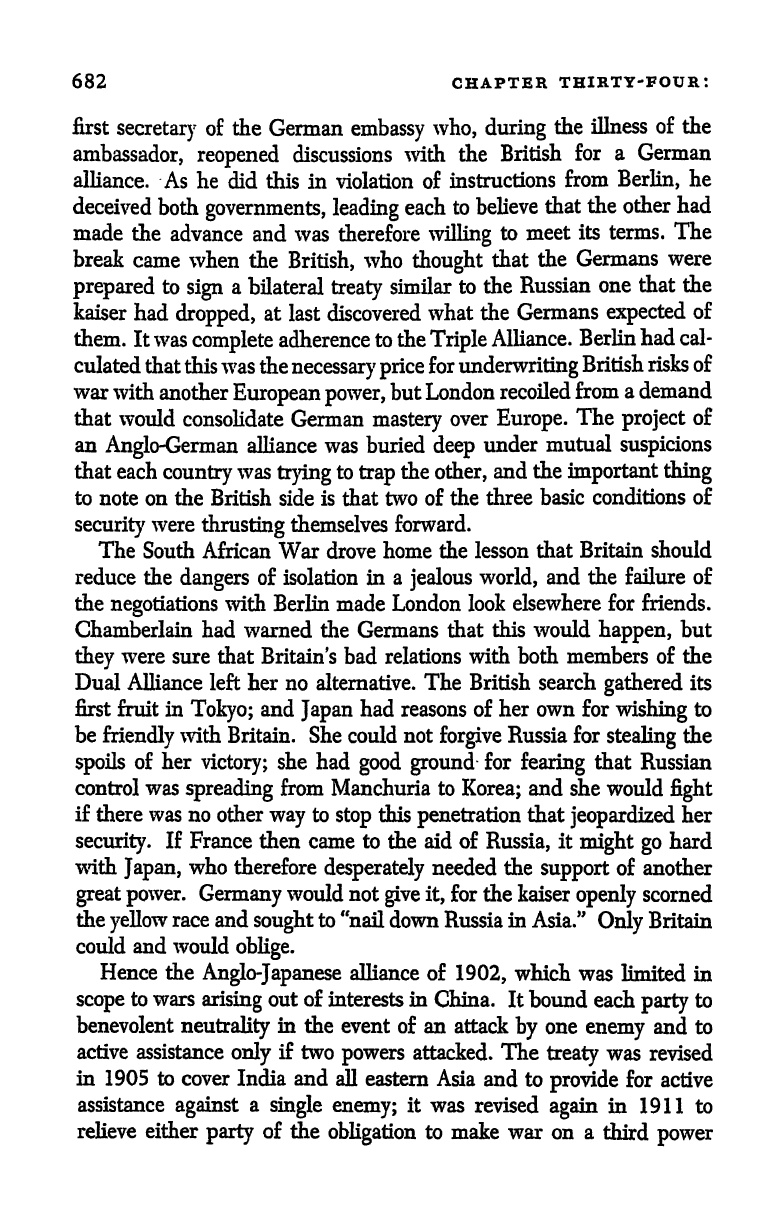
682
CHAPTER
THIRTY-FOUR:
first
secretary
of the
German
embassy
who,
during
the
illness
of
the
ambassador,
reopened
discussions
with
the
British
for
a German
alliance. As he
did this in
violation
of
instructions
from
Berlin,
he
deceived
both
governments,
leading
each
to
believe
that
the other
had
made
the
advance
and was therefore
willing
to
meet
its
terms.
The
break
came when
the
British,
who
thought
that
the
Germans
were
prepared
to
sign
a
bilateral
treaty
similar
to
the
Russian
one
that the
kaiser
had
dropped,
at
last discovered
what
the Germans
expected
of
them.
It
was
complete
adherence
to the
Triple
Alliance.
Berlin
had cal-
culated that
this
was the
necessary
price
for
underwriting
British
risks of
war
with
another
European
power,
but
London
recoiled
from
a
demand
that
would
consolidate German
mastery
over
Europe.
The
project
of
an
Anglo-German
alliance was
buried
deep
under
mutual
suspicions
that
each
country
was
trying
to
trap
the
other,
and
the
important thing
to
note
on
the
British side
is
that
two
of
the
three basic
conditions
of
security
were
thrusting
themselves
forward.
The
South
African War
drove
home the lesson
that
Britain should
reduce the
dangers
of isolation in
a
jealous
world,
and
the
failure
of
the
negotiations
with Berlin made London look
elsewhere for friends.
Chamberlain
had
warned
the
Germans
that
this
would
happen,
but
they
were sure
that Britain's
bad relations
with both members of the
Dual Alliance left her
no
alternative. The British search
gathered
its
first fruit in
Tokyo;
and
Japan
had reasons of
her own for
wishing
to
be
friendly
with Britain. She
could
not
forgive
Russia
for
stealing
the
spoils
of
her
victory;
she had
good
ground
for
fearing
that
Russian
control
was
spreading
from Manchuria to
Korea;
and she
would
fight
if
there was no
other
way
to
stop
this
penetration
that
jeopardized
her
security.
If France then
came to
the
aid
of
Russia,
it
might go
hard
with
Japan,
who
therefore
desperately
needed
the
support
of
another
great
power.
Germany
would not
give
it,
for
the kaiser
openly
scorned
the
yellow
race
and
sought
to
"nail down Russia
in
Asia."
Only
Britain
could
and
would
oblige.
Hence
the
Anglo-Japanese
alliance of
1902,
which
was
limited
in
scope
to
wars
arising
out of
interests in
China. It
bound each
party
to
benevolent
neutrality
in the
event
of an attack
by
one
enemy
and
to
active
assistance
only
if
two
powers
attacked.
The
treaty
was revised
in 1905 to cover
India and all eastern
Asia
and
to
provide
for active
assistance
against
a
single enemy;
it was
revised
again
in
1911
to
relieve
either
party
of the
obligation
to
make war
on
a
third
power
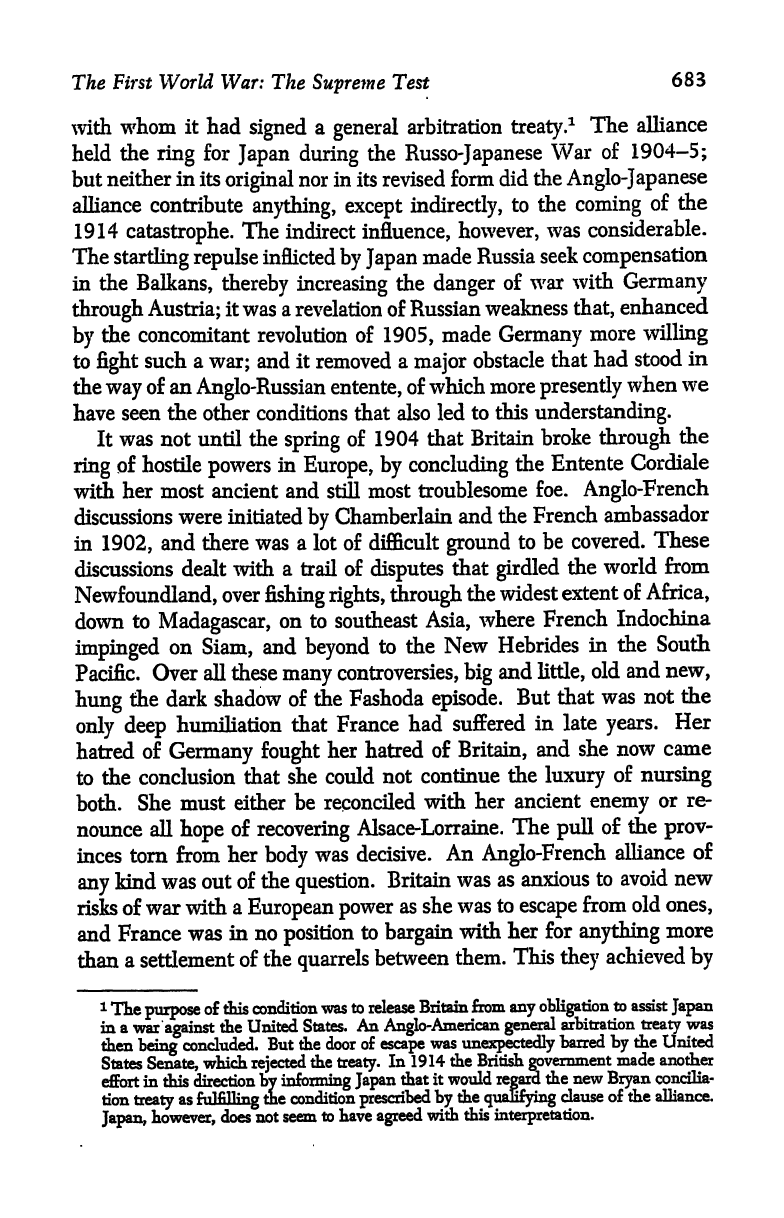
The
First World
War:
The
Supreme
Test
683
with
whom
it
had
signed
a
general
arbitration
treaty.
1
The
alliance
held
the
ring
for
Japan
during
the
Russo-Japanese
War
of
1904-5;
but
neither
in its
original
nor in
its revised
form
did
the
Anglo-Japanese
alliance
contribute
anything,
except
indirectly,
to
the
coming
of
the
1914
catastrophe.
The indirect
influence,
however,
was
considerable.
The
startling
repulse
inflicted
by Japan
made
Russia
seek
compensation
in
the
Balkans,
thereby
increasing
the
danger
of
war
with
Germany
through
Austria;
it
was
a
revelation of
Russian
weakness
that,
enhanced
by
the
concomitant
revolution
of
1905,
made
Germany
more
willing
to
fight
such
a
war;
and
it
removed
a
major
obstacle
that
had
stood
in
the
way
of
an
Anglo-Russian
entente,
of
which
more
presently
when
we
have
seen
the
other
conditions
that
also led
to
this
understanding.
It
was
not
until
the
spring
of
1904
that
Britain
broke
through
the
ring
of
hostile
powers
in
Europe, by
concluding
the
Entente
Cordiale
with
her most ancient and still
most
troublesome
foe.
Anglo-French
discussions
were
initiated
by
Chamberlain
and
the
French
ambassador
in
1902,
and there
was a
lot of
difficult
ground
to be
covered.
These
discussions
dealt
with
a
trail of
disputes
that
girdled
the
world
from
Newfoundland,
over
fishing rights,
through
the
widest
extent
of
Africa,
down
to
Madagascar,
on to southeast
Asia,
where
French
Indochina
impinged
on
Siam,
and
beyond
to
the
New
Hebrides
in
the
South
Pacific.
Over
all
these
many
controversies,
big
and
little,
old
and
new,
hung
the dark shadow
of
the Fashoda
episode.
But
that
was
not
the
only
deep
humiliation
that France
had
suffered
in
late
years.
Her
hatred
of
Germany
fought
her
hatred
of
Britain,
and
she
now
came
to
the
conclusion
that
she could
not continue
the
luxury
of
nursing
both.
She
must
either
be
reconciled
with
her
ancient
enemy
or
re-
nounce
all
hope
of
recovering
Alsace-Lorraine.
The
pull
of
the
prov-
inces torn
from
her
body
was
decisive.
An
Anglo-French
alliance
of
any
kind
was
out of
the
question.
Britain
was
as
anxious
to avoid
new
risks of
war
with
a
European
power
as
she
was
to
escape
from
old
ones,
and
France
was
in no
position
to
bargain
with
her for
anything
more
than
a
settlement
of
the
quarrels
between
them.
This
they
achieved
by
1
The
purpose
of
this condition
was
to
release
Britain from
any
obligation
to
assist
Japan
in
a
war
against
the
United
States.
An
Anglo-American
general
arbitration
treaty
was
then
being
concluded.
But the
door
of
escape
was
unexpectedly
barred
by
the
United
States
Senate,
which
rejected
the
treaty.
In
1914
the
British
government
made another
effort
in this direction
by
informing
Japan
that
it would
regard
the
new
Bryan
concilia-
tion
treaty
as
fulfilling
the
condition
prescribed
by
the
qualifying
clause
of the
alliance.
Japan,
however,
does not
seem
to have
agreed
with
this
interpretation.
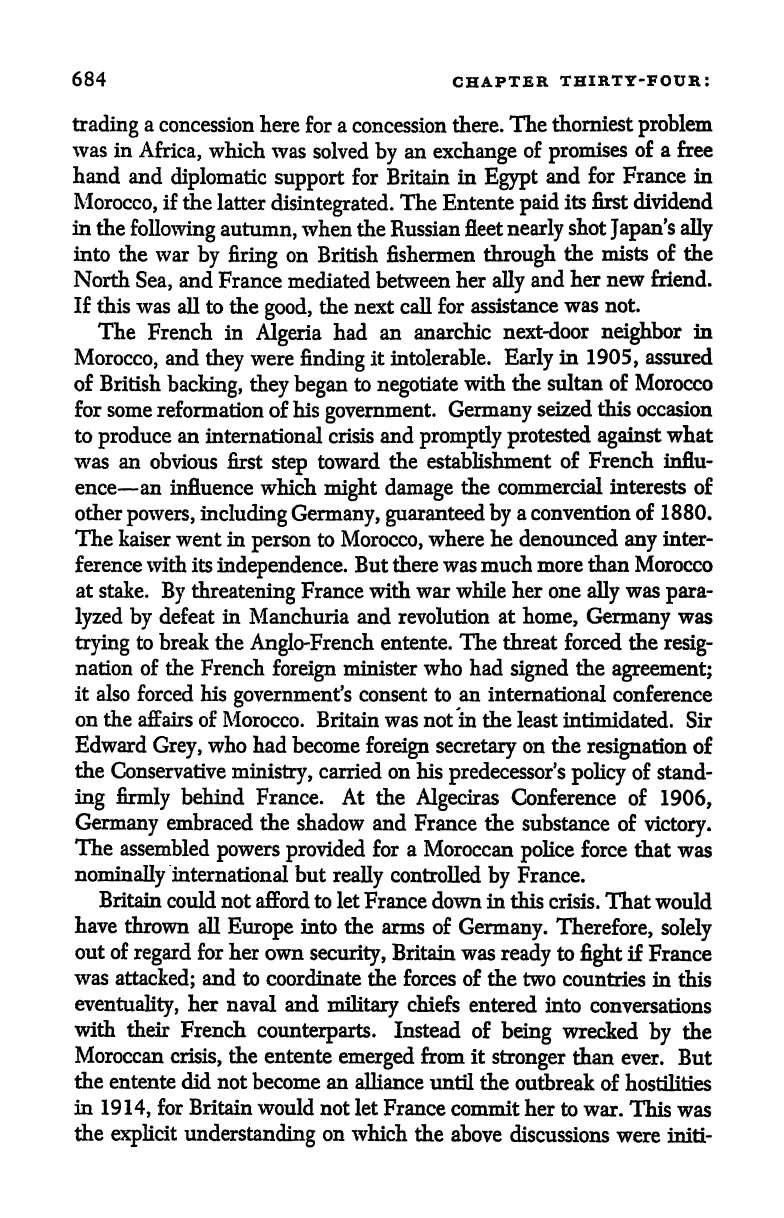
684
CHAPTER
THIRTY-FOUR:
trading
a
concession here
for
a
concession
there.
The
thorniest
problem
was
in
Africa,
which
was
solved
by
an
exchange
of
promises
of
a
free
hand
and
diplomatic
support
for
Britain
in
Egypt
and
for
France
in
Morocco,
if
the
latter
disintegrated.
The
Entente
paid
its first
dividend
in
the
following
autumn,
when
the
Russian fleet
nearly
shot
Japan's
ally
into the war
by
firing
on British fishermen
through
the
mists of
the
North
Sea,
and
France
mediated
between
her
ally
and
her
new
friend.
If
this was
all to the
good,
the
next call
for
assistance
was not.
The
French in
Algeria
had
an
anarchic
next-door
neighbor
in
Morocco,
and
they
were
finding
it intolerable.
Early
in
1905,
assured
of British
backing,
they
began
to
negotiate
with the
sultan of
Morocco
for some
reformation of
his
government.
Germany
seized
this
occasion
to
produce
an
international crisis
and
promptly
protested
against
what
was
an
obvious first
step
toward
the establishment
of
French influ-
ence an
influence
which
might
damage
the
commercial
interests
of
other
powers,
including
Germany, guaranteed
by
a
convention
of
1880,
The
kaiser went in
person
to
Morocco,
where he
denounced
any
inter-
ference with
its
independence.
But
there was much
more than Morocco
at
stake.
By
threatening
France
with
war
while
her one
ally
was
para-
lyzed
by
defeat in
Manchuria
and
revolution
at
home,
Germany
was
trying
to break the
Anglo-French
entente. The
threat
forced the
resig-
nation of
the French
foreign
minister who
had
signed
the
agreement;
it
also
forced his
government's
consent to an
international
conference
on the
affairs
of
Morocco. Britain
was
not in
the least
intimidated.
Sir
Edward
Grey,
who had become
foreign secretary
on
the
resignation
of
the
Conservative
ministry,
carried
on
his
predecessor's
policy
of stand-
ing
firmly
behind France.
At the
Algeciras
Conference
of
1906,
Germany
embraced the
shadow
and
France
the
substance of
victory.
The
assembled
powers
provided
for
a
Moroccan
police
force
that
was
nominally
international
but
really
controlled
by
France.
Britain
could
not afford to let
France down in
this
crisis. That
would
have
thrown
all
Europe
into the arms of
Germany.
Therefore,
solely
out of
regard
for
her
own
security,
Britain
was
ready
to
fight
if
France
was
attacked;
and
to
coordinate
the forces of the
two
countries
in this
eventuality,
her
naval and
military
chiefs
entered into
conversations
with
their
French
counterparts.
Instead
of
being
wrecked
by
the
Moroccan
crisis,
the entente
emerged
from it
stronger
than ever.
But
the
entente
did
not become
an
alliance
until
the
outbreak
of
hostilities
in
1914,
for Britain
would not
let
France
commit her
to
war.
This was
the
explicit
understanding
on
which
the
above
discussions
were initi-
